Learn how to make perfectly fluffy pita bread at home, and create the perfect vessel for falafel and shawarma, or for scooping up hummus and tzatziki.
Pita bread, famous for its characteristic pocket, is a well known staple in Middle Eastern and Mediterranean cuisines. This round, fluffy, and slightly leavened bread has ancient origins, with evidence suggesting its existence since around 14,000 years ago. Made primarily from wheat flour, water, yeast, and salt, its simple ingredients belie the versatility it brings to the table.
When baked at a high temperature, the dough puffs up, creating a hollow center which, when cut open, forms the renowned pocket. This pocket is the perfect vessel for stuffing with various fillings, from falafel to shawarma, making pita an important component in many dishes across the Mediterranean. Additionally, its slightly chewy texture with a hint of yeasty aroma is perfect for scooping up dips like hummus, babaganoush or tzatziki.
Now, the problem with pita is that the supermarket versions are usually pretty boring. Stale. Chewy. Not the fluffy clouds of bread that you’ll remember from your last trip abroad.
But there’s a solution. Make ’em yourself. It’s not very difficult, and the result is that perfectly fluffy pocket!
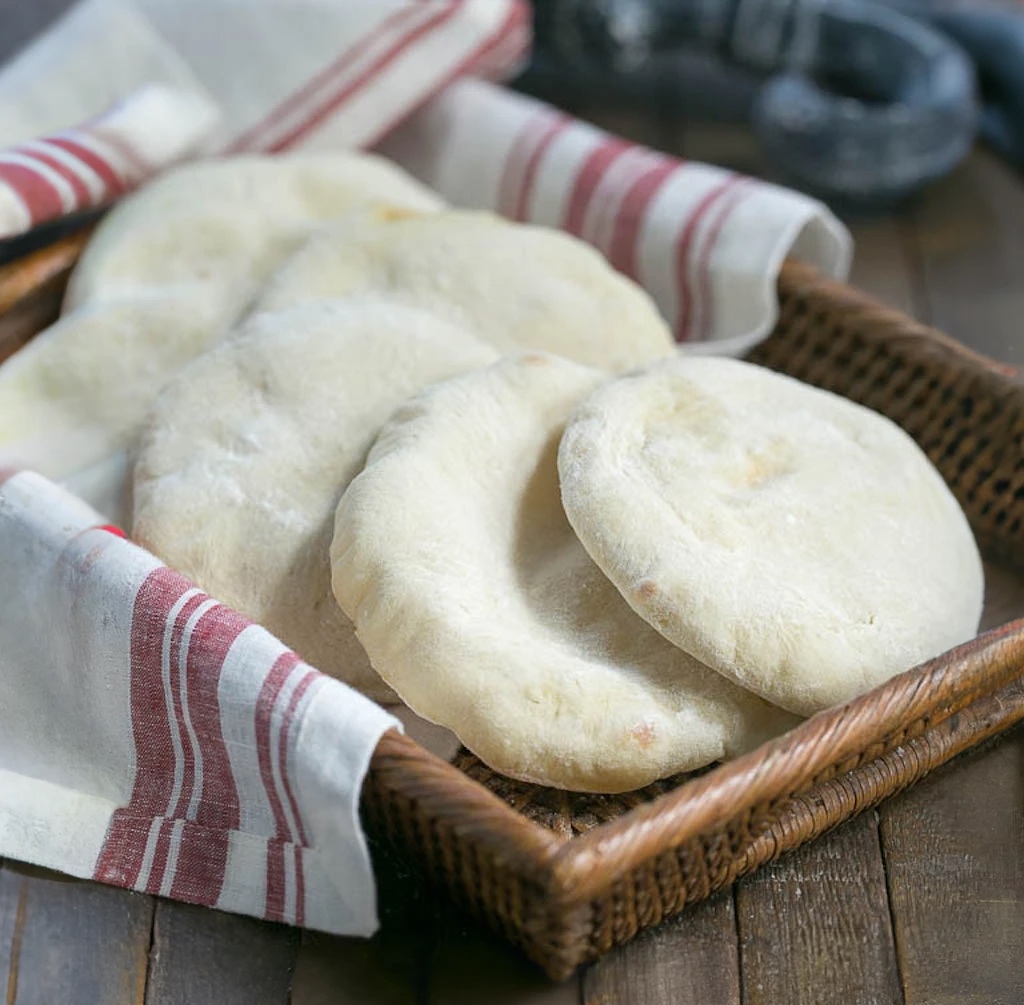
How to Make Pita Bread
1. Activate the Yeast:
Begin by placing your heavy-duty stand mixer on the counter and fitting it with the dough hook. In the mixer’s bowl, combine the instant yeast, sugar, and warm water. Stir gently to blend. Ensure the water is warm, but not too hot, as overly hot water can kill the yeast. Allow the mixture to sit undisturbed for about 5 to 10 minutes. You’ll know it’s ready when a layer of foam appears on the surface, indicating the yeast is activated.
2. Incorporate the Dry Ingredients:
Now, stir in the salt. Start adding the bread flour bit by bit, mixing at the mixer’s lowest speed. This gradual incorporation ensures an even consistency and prevents the flour from puffing out. Continue mixing for about 4 minutes, or until the ingredients come together to form a cohesive dough ball.
3. Knead the Dough:
Transfer the dough onto a lightly floured surface. Knead it gently but firmly, pressing and folding until it feels smooth and elastic. This step develops the gluten, essential for the bread’s structure.
4. First Rise:
Lightly grease a mixing bowl with olive oil. Place your kneaded dough into this bowl, ensuring the dough’s top surface gets a light coating of oil—this prevents it from drying out. Cover the bowl with plastic wrap and let it sit in a warm, draft-free corner of your kitchen. Allow the dough to rise until it’s doubled in size, which usually takes about 1½ hours.
5. Preheat the Oven:
As your dough nears the end of its rise, get your oven ready. Place a large pizza stone on a lower oven rack and set the oven to preheat at a temperature of 500º. This high heat ensures the characteristic puff of the pita bread.
6. Divide and Rest:
Once the dough has risen, give it a gentle punch to release any trapped air. Then, divide it into 8 equal portions. Shape each portion into a smooth ball, lightly dust them with flour, and cover with a towel or plastic wrap. Let these dough balls rest for about 15 minutes. This short rest relaxes the gluten, making the next step easier.
7. Roll the Dough:
Using a rolling pin, take each dough ball and roll it out into a 6-8 inch round. Aim for a thickness of about ¼-inch. It’s crucial to ensure that the round is even with no creases or folds, as this will aid in the bread puffing up evenly during baking. Once rolled, cover them to prevent drying.
8. Baking:
Now for the exciting part! Carefully place two of your prepared dough rounds onto the preheated pizza stone in the oven. Bake for 3 to 4 minutes. You’ll see them puff up beautifully, becoming hollow in the center. Monitor closely to ensure they turn a pale golden color without burning.
9. Cooling:
Once baked, remove the pita bread from the oven and transfer them to a wire rack. This ensures they remain crisp and don’t turn soggy from trapped steam. Allow them to cool slightly.
10. Serve and Enjoy:
Your homemade pita breads are now ready! Slice them open to reveal the pocket and fill with your favorite ingredients, or simply enjoy them as they are with dips like hummus or tzatziki.

Homemade Pita Bread
- Total Time: 0 hours
- Yield: 8 pitas 1x
Description
Learn how to make perfectly fluffy pita bread at home, and create the perfect vessel for falafel and shawarma, or for scooping up hummus and tzatziki.
Ingredients
- 1 package instant yeast (I used Red Star Platinum yeast)
- 1 teaspoon sugar
- 1 1/2 cups warm water
- 1 teaspoon salt
- 3 1/2 cups bread flour
- 1 teaspoon olive oil
Instructions
1. Activate the Yeast: Begin by placing your heavy-duty stand mixer on the counter and fitting it with the dough hook. In the mixer’s bowl, combine the instant yeast, sugar, and warm water. Stir gently to blend. Ensure the water is warm, but not too hot, as overly hot water can kill the yeast. Allow the mixture to sit undisturbed for about 5 to 10 minutes. You’ll know it’s ready when a layer of foam appears on the surface, indicating the yeast is activated.
2. Incorporate the Dry Ingredients: Now, stir in the salt. Start adding the bread flour bit by bit, mixing at the mixer’s lowest speed. This gradual incorporation ensures an even consistency and prevents the flour from puffing out. Continue mixing for about 4 minutes, or until the ingredients come together to form a cohesive dough ball.
3. Knead the Dough: Transfer the dough onto a lightly floured surface. Knead it gently but firmly, pressing and folding until it feels smooth and elastic. This step develops the gluten, essential for the bread’s structure.
4. First Rise: Lightly grease a mixing bowl with olive oil. Place your kneaded dough into this bowl, ensuring the dough’s top surface gets a light coating of oil—this prevents it from drying out. Cover the bowl with plastic wrap and let it sit in a warm, draft-free corner of your kitchen. Allow the dough to rise until it’s doubled in size, which usually takes about 1½ hours.
5. Preheat the Oven: As your dough nears the end of its rise, get your oven ready. Place a large pizza stone on a lower oven rack and set the oven to preheat at a temperature of 500º. This high heat ensures the characteristic puff of the pita bread.
6. Divide and Rest: Once the dough has risen, give it a gentle punch to release any trapped air. Then, divide it into 8 equal portions. Shape each portion into a smooth ball, lightly dust them with flour, and cover with a towel or plastic wrap. Let these dough balls rest for about 15 minutes. This short rest relaxes the gluten, making the next step easier.
7. Roll the Dough: Using a rolling pin, take each dough ball and roll it out into a 6-8 inch round. Aim for a thickness of about ¼-inch. It’s crucial to ensure that the round is even with no creases or folds, as this will aid in the bread puffing up evenly during baking. Once rolled, cover them to prevent drying.
8. Baking: Now for the exciting part! Carefully place two of your prepared dough rounds onto the preheated pizza stone in the oven. Bake for 3 to 4 minutes. You’ll see them puff up beautifully, becoming hollow in the center. Monitor closely to ensure they turn a pale golden color without burning.
9. Cooling: Once baked, remove the pita bread from the oven and transfer them to a wire rack. This ensures they remain crisp and don’t turn soggy from trapped steam. Allow them to cool slightly.
10. Serve and Enjoy: Your homemade pita breads are now ready! Slice them open to reveal the pocket and fill with your favorite ingredients, or simply enjoy them as they are with dips like hummus or tzatziki.
- Prep Time: 2hr
- Cook Time: 5 mins
- Category: Bread
- Method: Baking
- Cuisine: Middle Eastern







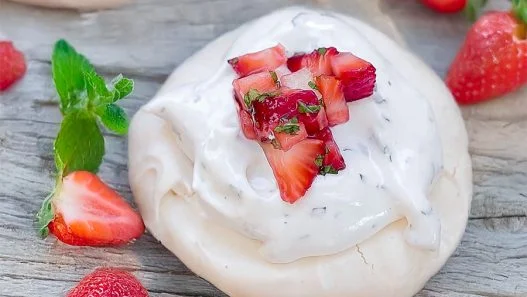

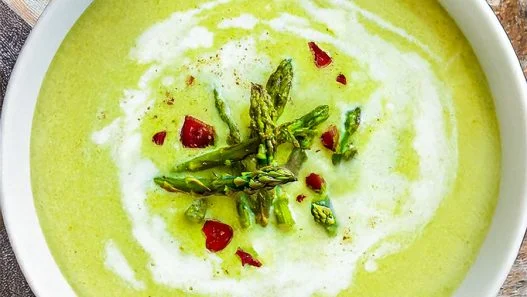


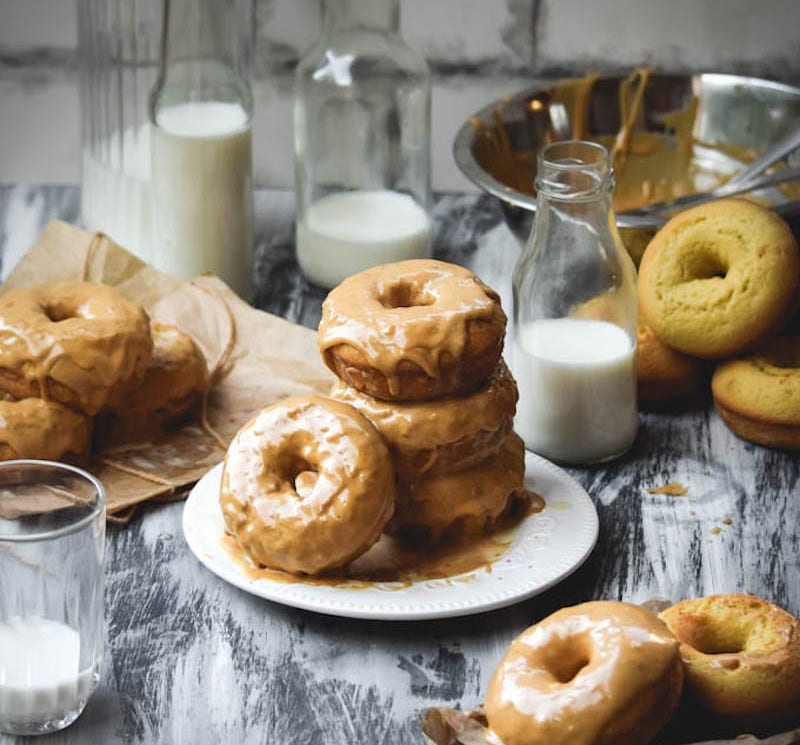


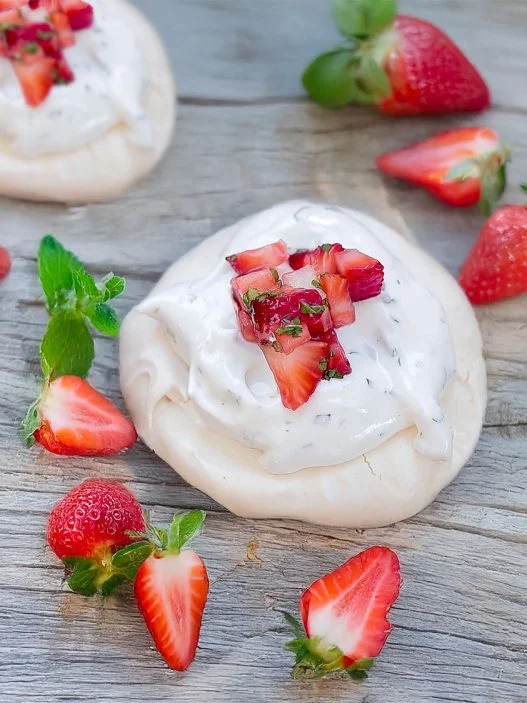
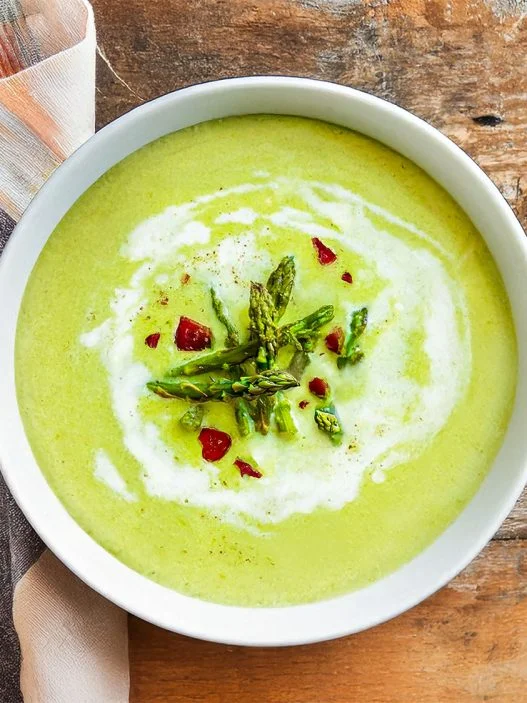

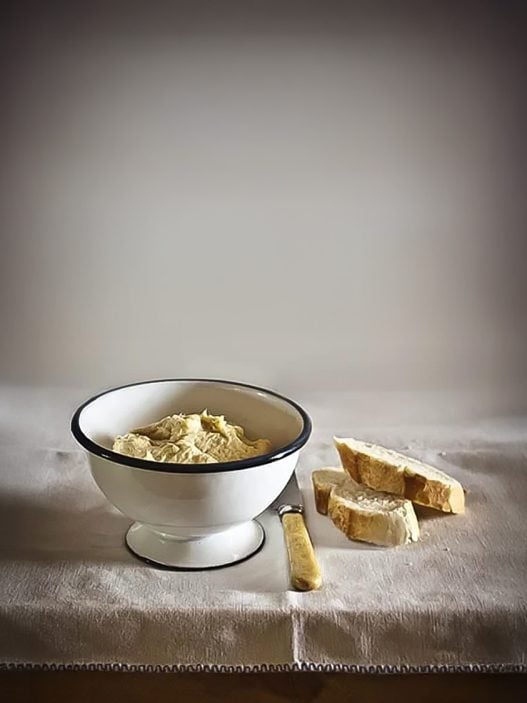

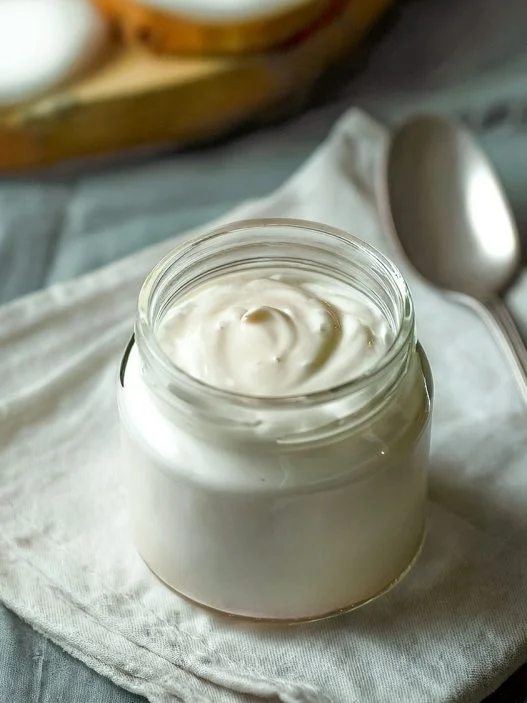
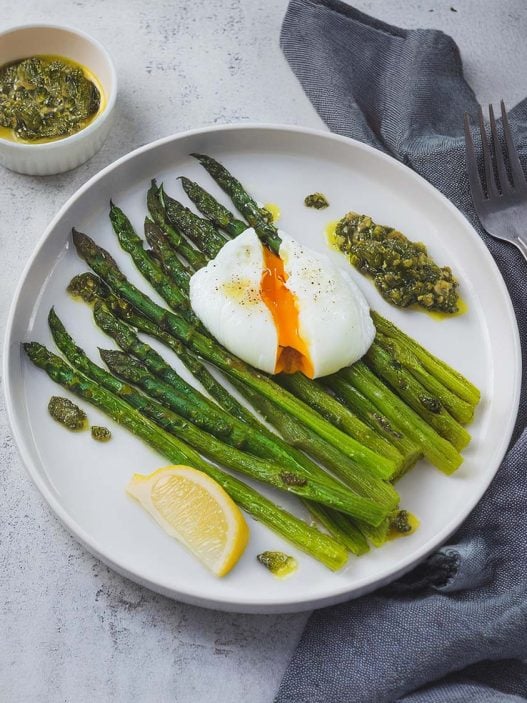

I have a complicated relationship with bread and pastries, but I’ll try to do it, thanks to you. this is very inspiring!
This was really a fabulous recipe, my pitas turned out perfect. Thank you, making again very soon!
I often bake bread at home, but every time the result is different, sometimes it seems to me that everything is important for bread – the weather, air humidity, mood, literally everything!
Yes, bread baking is an art – and “everything matters”. But this recipe will get you some great pita bread, every time!
Thank you!
Oh, wow, this is amazing – they turned out perfectly!
Holy cow, this turned out so perfect!
I made this yesterday, and I have to say this is a great recipe. I think I overproofed them a little, but they were still delicious. Served with a greek salad, thank you very much!